Sms
-
- Safety Management Systems: A Good fit for Passenger Vessels? Marine News, Jan 2019 #30
The evidence and industry subject matter experts both say ‘yes.’
In its recently released SAFER SEAS DIGEST, Lessons Learned from Marine Accident Investigations (2017), the National Transportation Safety Board (NTSB) reports investigating numerous accidents across all modes of transportation where a properly implemented safety management system (SMS) could have prevented injuries, loss of life, or material damage. That document spans analysis of casualties across the full spectrum of all manners of marine craft, blue water and brown, foreign and domestic.
Different authorities and subject matter experts (SME) differ on how they might explain a SMS, but it all adds up to one thing. But, what is a Safety Management System? A sampling of descriptive language is a good place to start:NTSB
An effective SMS has a company safety policy, a risk management program, a safety assurance system, and a safety promotion program. The safety policy is management’s commitment to continually improve safety.
USCG
A safety culture refers to the attitudes, beliefs, perceptions, and values that employees share in relation to safety. An effective QMS should support and encourage a “safety culture” to address issues of human error and omissions while continually improving compliance with the applicable regulations.
PVA
A safety management system (SMS) is a structured and documented system enabling both shore side and vessel side personnel to effectively manage safety through a proactive culture of continual improvement.
Safety Management Systems in Practice
Safety Management Systems (SMS) have been around a long time, and take their most prominent roots from blue water shipping. Eventually – in places like the towboat industry’s newly regulated Subchapter M rules – those procedures and systems found their way into brown water operations. They are here to stay. Some passenger vessel operators have had their own unique SMS up and running for years.PVA’s Flagship SMS, for example, is a voluntary safety management system that is tailored for domestic passenger and small passenger vessels. The PVA Flagship SMS was developed in cooperation with the U.S. Coast Guard, and in December 2016, PVA submitted Flagship SMS to Coast Guard Headquarters for acceptance. On June 12, 2017, the Coast Guard's Director of Inspections and Compliance formally recognized PVA's Flagship SMS as an acceptable method for developing and implementing a company specific voluntary SMS. Specifically, the Coast Guard determined that Flagship SMS meets the objectives and functional requirements of a SMS as per 33 Code of Federal Regulations Part 96, Rules for the Safe Operation of Vessels and Safety Management Systems. It provides the framework to develop, implement and maintain the SMS.
That effort is now yielding fruit. Dozens of PVA member companies, representing nearly 200 vessels have requested the framework and tools associated with Flagship SMS. Being a voluntary system, members implementing Flagship or its elements do not need to have third party verification. Much like the approved Alternate Security Program, the PVA Flagship SMS incorporates internal audits to determine the effectiveness of implementation.
Regulators & Operators: a unique safety partnership
Captain Lee Boone is the Chief of the U.S. Coast Guard’s Office of Investigations & Casualty Analysis. Assigned to U.S. Coast Guard Headquarters from 2008 to 2012, he led the U.S. Coast Guard’s Domestic Vessel Compliance Division, responsible for U.S. Flag marine inspection policy. Boone knows a problem when he sees it, and in most cases, what to do about it, when he does.More than a few domestic passenger vessel operators use SMS in their daily operation. Some do not. That’s because, despite being a heavily regulated sector, SMS is not required for passenger vessels. Boone answers the obvious question by saying, “The Coast Guard encourages the implementation of best practices, like SMS’s, even in the absence of regulation. Successful operators will probably tell you that compliance with safety standards is but one ‘fruit’ of an SMS and healthy safety culture. The beauty of a voluntarily implemented SMS is that everybody knows that you’re doing it ‘because you want to, not because you have to.’ This is a powerful commitment to safety that goes beyond posting ‘safety first’ signs.”
Similarly, Richard Paine, the Regional Director, HSSQE, for Hornblower NYC Ferry and Statue Cruises has his own opinions. Hornblower’s commitment to safety and customer service is something that has been at the heart of the organization since its early years. “I’ve been with Hornblower for over ten years and to see what we have been able to accomplish and provide our crews and the public is something I am very proud to be a part of,” he told MarineNews, adding quickly, “Our management system is an integrated management system that focuses on Quality, Health & Safety, as well as environmental stewardship. Our robust system is certified and audited at the highest level under the ISO 9001, ISO 14001 & ISO 45001/OHSAS 18001 standards.”
Notably, explains Paine, each of Hornblower’s operations – from coast to coast – have some differences in their system, related to types of services offered and their fleet, but overall share the same commitment to continual improvement.
Measuring Success: ROI comes in many forms
Some SMS advocates tout a ‘return on investment’ of an SMS. But, measuring that ROI means different things to different people, and isn’t necessarily a linear metric. Paine explains it from the operator’s standpoint, saying, “A strong SMS will allow operators to monitor and measure equipment usage to determine how best to procure parts inventories, or how to use information from a near-miss incident to prevent an injury. Accidents will still happen, but an effective SMS will minimize exposure by closing holes in an operation that may lead to ‘swiss-cheese’ effect, which means that incidents and injuries don’t happen because of just one hole or error, but instead multiple layers of problems that allow an incident to take place.”Measuring success can be achieved via data collection and seeing a reduction in injuries, incidents or damages. It can be measured in reductions of insurance premiums, fines or turnover. It can be measured by having zero non-conformities during an audits or no 835’s in a USCG inspection. Paine puts it a different way. “The quantitative data speaks loudly, but I believe the most successful way to measure safety is by watching your people. Do they take drills and training seriously? Do they hold others and more importantly, themselves accountable for working in a safe environment? If the answer is yes, to any of those questions, then that is how you can truly not only measure, but define ‘success.’ Safety is about people. Hornblower’s top priority is to maintain and safety for all of our passengers.”
Separately, the NTSB recently issued the Coast Guard two safety recommendations (M-02-5 and M-12-3) to require all operators of U.S.-flag passenger vessels develop and implement a preventive maintenance program, and a safety management system, respectfully. These recommendations were reiterated as a result of the Island Lady casualty in January 2018. Captain Boone adds, “The U.S. Coast Guard is addressing both of these recommendations through a regulatory project to implement the requirements of Section 610 of the 2010 Coast Guard Authorization Act (Pub. L. 111-281). In the meantime, operators don’t have to wait to be told to implement a SMS … they can implement one voluntarily and be ahead of the game.”
Importantly, the Coast Guard sees and offers benefits to those operators with strong SMS. In fact, by policy signed in April 2017, the US Coast Guard offers reduced scope inspections to small passenger vessels if their SMS is audited by a third-party organization. Even if not audited by a third-party organization, SMS’s should result in higher performing vessels that could also result in reduced scope inspections. Boone reports that, in just a short time since the Coast Guard has offered this program, many small passenger vessels have taken advantage of this opportunity, amounting to 209 reduced scope inspections in 2018. He explains further, “As SMS’s grow in the domestic fleet of small passenger vessels, we expect reduced scope inspections to also grow.”
The PVA Flagship SMS program, as another example, was developed in partnership with the Coast Guard, and exemplifies PVA's commitment to safety. From a US Coast Guard perspective, however, the program is too new, and the numbers are too small to (yet) provide any national-level metrics. Says Boone, “One would expect to see over time, reduced deficiencies during inspections and reduced marine casualties, among other ‘fruit’ from a healthy safety culture.”
Looking (& Planning) Ahead
The SMS has been around a long time. Subchapter M is now heralding the advent of similar changes for the inland towboat sector. And, the passenger vessel sector is cooking up its own version of this emerging safety culture tool. Not everyone is on board with it. USCG Captain Boone thinks that’s about to change, but at the same time, change won’t come easily.“Quite simply, culture is complex and hard to change. Even with the implementation of the International Safety Management Code (ISM) decades ago, there are still pockets of non-believers, skeptics and those that are simply not familiar with it. Let’s face it, ‘systems thinking’ is a higher-level skill and it takes investment to get there. The US Coast Guard recognized its own SMS issues in the aftermath of the sinking and loss of EL FARO, when the Commandant directed in his Final Action Memo (FAM) for marine inspectors to be better trained in ISM and SMS.”
As a starting point, most stakeholders agree that while certainly it takes leadership commitment to create a healthy safety culture, just as important is the reciprocal engagement of employees, their personal accountability, and their inquiring attitude that sustains it. The Coast Guard’s Chief of Investigations & Casualty Analysis, perhaps, says it best when he insists, “The fear of getting bitten by the U.S. Coast Guard is NOT why you should have a SMS. Fear usually gets you compliance at best, concealment at worst; falling far short of the target for which we all should be aiming … For all its merits, however, we should all keep our eyes open for the pervasive by-product called compliance culture, wherein safety is static, only achieves the minimum, and exists mostly to satisfy regulators; all of which leads to overconfidence in our system, which can be dangerous.”
For all that, however, improved compliance with safety standards can sometimes dominate what the Coast Guard sees and measures. To truly assess whether SMS is doing what was intended, operators should assess their own safety culture regularly. Boone, of course, has his ideas on how that should evolve. “I recommend using the Bureau of Safety and Environmental Enforcement’s (BSEE) “Nine characteristics of a robust safety culture” as a benchmark to assess how you’re doing: www.bsee.gov/newsroom/latest-news/statements-and-releases/press-releases/bsee-announces-final-safety-culture. Outside help may be needed to get started, but vessel operators should be willing to use whatever works including climate surveys and interviews to get the truth.”
Whatever your route to compliance and safe operations, don’t wait until it’s too late to find out you’ve got a safety culture problem.
This article first appeared in the January print edition of MarineNews magazine.
-
- SAFETY: Dollars & Sense Marine News, Nov 2019 #26
Make a Profit with a Safety Management System (SMS).Organizations in the maritime industry act no differently than any other successful global business unit. Major decisions are made with a certain underlying commitment – a commitment to customers, stakeholders and employees. That commitment can be oversimpli
-
- Partnerships Drive SubChapter M Solutions Marine News, Mar 2017 #32
more urgently so, as the proverbial clock is now ticking for real. The deadline for meeting the USCG requirement for having a safety management system (SMS) in place and completed vessel surveys and external audits, may be July 20, 2018, but it’s less a date you should be looking at meeting, as it is the
-
- Choose Wisely: A Deep Dive into Domestic Passenger Vessels SMS Proposed Rulemaking Marine News, May 2021 #18
On January 15, 2021, the U.S. Coast Guard issued an Advanced Notice of Proposed Rulemaking (ANPRM) for Safety Management System (SMS) requirements in the domestic passenger vessel industry (Docket No. USCG-2020-0123). This requirement will have the largest implications on the domestic passenger vessel
-
- The Master’s Authority: a Vital SMS Caveat Marine News, Apr 2016 #18
As safety management systems (SMS) on board vessels evolve, the vessel’s master still holds ultimate authority. Subchapter M is finally underway. A starring role in this new CFR is a safety management system onboard all vessels. While this system dictates how the vessel is to be operated and under what
-
- Get Started! Benefits, Advice Abound for SMS Laggards Marine News, Sep 2015 #38
on the wall,” they aren’t just talking about the pending Subchapter M regulations, but also about the already existing demand for safety management systems (SMS) in general for the domestic towing industry. While the U.S. Coast Guard and Homeland Security work to finalize Subchapter M requirements, operators
-
- SMS To Represent Two Scandinavian Co.'s In U.S. —Brochure Available Maritime Reporter, Nov 1980 #37
Motor AB and Oresundsvarvet AB. G o t a v e r k e n Motor produces main and auxiliary diesel engines of Gotaverken, E r i k s b e r g and B&W design. SMS will also be responsible for marketing of their new Fuel Savings Program of engine modifications which offer substantial reductions in specific fuel
-
- SubM Debut Now Set for February 2016 Marine News, Sep 2015 #32
M, some of which are members of the AWO, which mandates that all members within a year of joining, be certified on its own U.S. Coast Guard-approved SMS, the Responsible Carrier Program (RCP). While they wait for SubM to wend its way through the regulatory process, operators can get SMS-certified by
-
- Many Different Vessels but One Goal – Passenger Safety Marine News, Feb 2024 #22
. But her focus shifts to one outstanding issue: the NTSB recommended, after its Conception investigation, that the USCG require safety management systems (SMS) on all passenger vessels. Four years later, she notes with concern that the SMS proposal is in limbo.“The time for action is now,” Homendy
-
- Class NK’s subM Strategy: Help is on the Way Marine News, May 2013 #22
to come. Local Partnerships, Strategies ClassNK began planning for the new regulations with inland operators in 2009. The acquisition of Maine-based SMSLLC in March is a continuation of that effort. Since 1996, Safety Management Systems, LLC (SMSLLC) has provided consulting services to maritime, transportatio
-
- Taking Lessons from El Faro to Assess Cyber Risk Maritime Reporter, Apr 2018 #14
code, it is the responsibility of the company—the owner or any other organization that has assumed responsibility for operation of a ship—to establish an SMS for its vessels. According to section 1.2.2 of the code, the SMS should “assess all identified risks to its ships, personnel and the environment and
-
- Subchapter M: Post Publication Highlights Marine News, Sep 2016 #28
An extra T in TSMS, nowhere left to hide from systems documentation, and an emphasis on continuous improvement. Back in January of this year, the United States Coast Guard (USCG) predicted Subchapter M would be released in spring 2016. I put my money on June 20, that being the very last day of spring
-
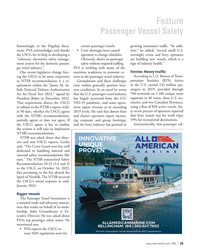 )
February 2024 - Marine News page: 25
)
February 2024 - Marine News page: 25. John Groundwater is Ex- ecutive Director. He was asked about PVA’s top passenger safety issues. He mentioned two: • PVA expects the USCG to issue SMS regulations soon for www.marinelink.com MN 25
-
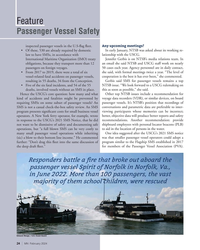 )
February 2024 - Marine News page: 24
)
February 2024 - Marine News page: 24vessels in the U.S-? ag ? eet. • Of these, 530 are already required by domestic In early January, NTSB was asked about its working re- law to have SMSs, in accordance with lationship with the USCG. International Maritime Organization (IMO) treaty Jennifer Gerbis is on NTSB’s media relations team
-
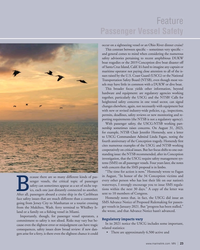 )
February 2024 - Marine News page: 23
)
February 2024 - Marine News page: 23her focus shifts to one out- standing issue: the NTSB recommended, after its Conception investigation, that the USCG require safety management sys- tems (SMS) on all passenger vessels. Four years later, she notes with concern that the SMS proposal is in limbo. “The time for action is now,” Homendy wrote
-
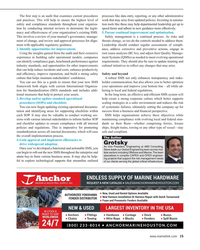 )
December 2023 - Maritime Reporter and Engineering News page: 15
)
December 2023 - Maritime Reporter and Engineering News page: 15internal reviews to determine the legiti- speed faster and adhere to new guidance more effectively. macy and effectiveness of your organization’s existing SMS. 5. Pursue continual improvement and optimization. This involves a review of your manual’s governance, manage- Safety management is a continual process
-
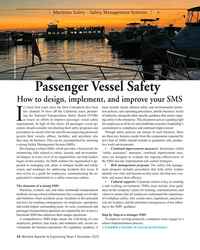 )
December 2023 - Maritime Reporter and Engineering News page: 14
)
December 2023 - Maritime Reporter and Engineering News page: 14Maritime Safety – Safety Management Systems Photo by Greg Trauthwein Passenger Vessel Safety How to design, implement, and improve your SMS t’s been four years since the fatal Conception dive boat must include clearly de? ned safety and environmental protec- ? re claimed 34 lives off the California coast
-
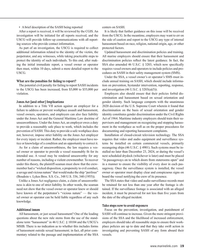 )
September 2023 - Maritime Reporter and Engineering News page: 19
)
September 2023 - Maritime Reporter and Engineering News page: 19a more detailed report to the requires vessel owners and operators to include policies and pro- USCG. cedures on SASH in their safety management system (SMS). Under the SSA, a vessel owner’s or operator’s SMS must in- What are the penalties for failing to report? clude annual training on SASH, which should
-
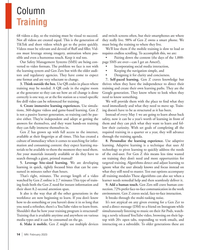 )
February 2023 - Marine News page: 14
)
February 2023 - Marine News page: 14this, we are: sible and even a humorous touch. Keep it real too. • Pairing down the content (the days of the 1,000- Our Safety Management Systems (SMS) are being con- page SMS are over—can I get an Amen!), verted to video formats. The problem we face is not with • Incorporating social media interaction
-
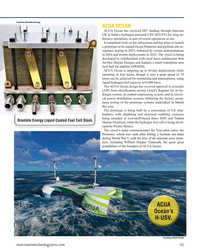 )
September 2022 - Marine Technology Reporter page: 45
)
September 2022 - Marine Technology Reporter page: 45prototype is being built by a consortium of UK ship- builders, with ship? tting and electrical out? tting contracts being awarded to Lowestoft-based ? rms SMS and Trident Bramble Energy Liquid Cooled Fuel Cell Stack. Marine Electrical, while the hydrogen fuel cell is being devel- oped by Proton Motors. The
-
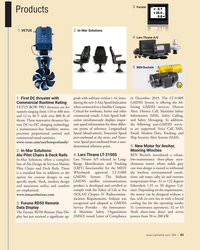 )
May 2022 - Marine News page: 43
)
May 2022 - Marine News page: 43for three differ- the following non-GMDSS servic- a maintenance-free brushless motor, ent points of reference: Longitudinal es are supported: Voice Call, SMS, precision proportional control and Speed (ahead-astern), Transverse Speed Email, Modem Data, Tracking, and commercial-rated runtimes. port-starboard
-
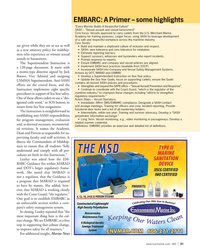 )
May 2022 - Marine News page: 31
)
May 2022 - Marine News page: 31requirements.” One of these allows cadets to use a “des- Action Steps – Vessel Operators: ignated code word,” or SOS button, to • Immediate: Af? rm SMS/EMBARC compliance. Designate a SASH contact and arrange meetings. Training for of? cers and crew. Incident reporting. Provide return from Sea Year
-
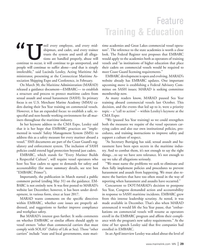 )
May 2022 - Marine News page: 29
)
May 2022 - Marine News page: 29it is her hope that EMBARC practices are “imple- rying cadets and also our own institutional policies, pro- mented in vessels’ Safety Management System (SMS): to cedures, and training instructions to improve safety and address this as a safety measure for every mariner aboard a support a culture of respect
-
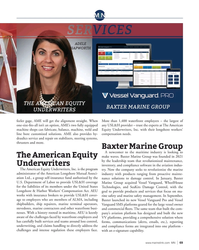 )
October 2021 - Marine News page: 69
)
October 2021 - Marine News page: 69are members of ALMA, including Baxter launched its new Vessel Vanguard Pro and Vessel shipbuilders, ship repairers, marine terminal operators, Vanguard SMS platforms geared for the large vessel owner stevedores, marine contractors and other waterfront busi- and commercial ? eets. The same team that built
-
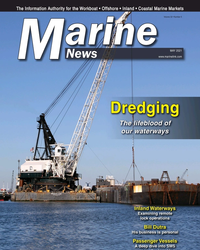 )
May 2021 - Marine News page: Cover
)
May 2021 - Marine News page: Coverlifeblood of our waterways Inland Waterways Examining remote lock operations Bill Dutra His business is personal Passenger Vessels A deep dive into SMS proposed rulemakin
-
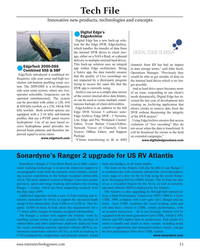 )
May 2021 - Marine Technology Reporter page: 53
)
May 2021 - Marine Technology Reporter page: 53every stage of a dive via the AvTrak using the secure Sonar- Alvin. The most updated version of Ranger 2 provides greater dyne Messaging Service (SMS) feature. The AvTrak can also precision, speed and range tracking and replaces the existing act as a relocation beacon for the Alvin, as well as remotely
-
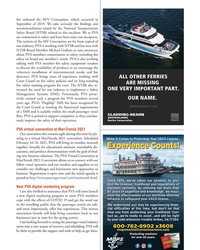 )
January 2021 - Marine News page: 23
)
January 2021 - Marine News page: 23its long-standing ? re safety training program for crew. The NTSB also re- iterated the need for our industry to implement a Safety Management Systems (SMS). Fortunately, PVA proac- tively created such a program for PVA members several years ago. PVA’s “Flagship” SMS has been recognized by the Coast Guard
-
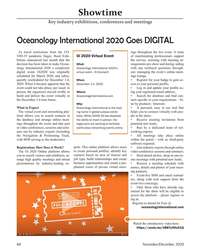 )
November 2020 - Marine Technology Reporter page: 60
)
November 2020 - Marine Technology Reporter page: 60ex- • Receive a meeting schedule with planned roster of private virtual meet- names, details and photos of your meet- ing partners; • Event-live SMS and email remind- ers, along with tech support from the event-live concierge; • Only those who have already reg- istered for the show will be eligible
-
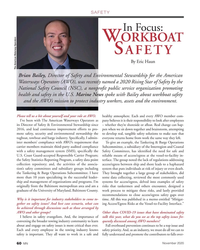 )
November 2020 - Marine News page: 60
)
November 2020 - Marine News page: 60carrier members maintain third-party audited compliance Subcommittee, a subsidiary of the Interregion and Coastal with a safety management system (SMS), speci? cally the Safety Committees, has identi? ed the need for safe and U.S. Coast Guard-accepted Responsible Carrier Program; reliable means
-
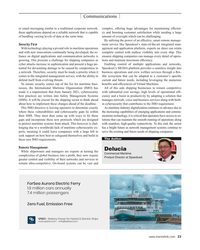 )
July 2020 - Maritime Reporter and Engineering News page: 23
)
July 2020 - Maritime Reporter and Engineering News page: 23, high levels of operational eff- best practices are written into Safety Management Systems ciency and a boost in productivity by adopting a solution that (SMS). It will be crucial for the shipping sector to think ahead manages network, voice and business services along with built- about how to implement these
-
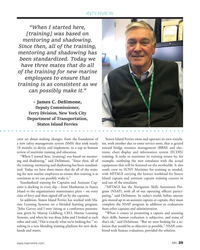 )
February 2020 - Marine News page: 39
)
February 2020 - Marine News page: 39Ferries crew set about making changes, from the foundation of Staten Island Ferries owns and operates its own simula- a new safety management system (SMS) that took nearly tor, with another due to enter service soon, that is geared 18 months to devise and implement, to a top to bottom toward bridge
-
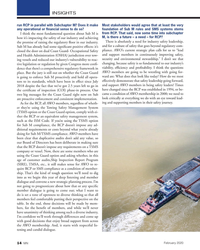 )
February 2020 - Marine News page: 14
)
February 2020 - Marine News page: 14M? Does it make Most stakeholders would agree that at least the very any operational or ? nancial sense to do so? foundation of Sub M rules and SMS systems stems from RCP. That said, now some time into subchapter I think the most fundamental question about Sub M is M, is there a future – a need
-
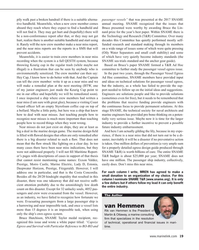 )
February 2020 - Maritime Reporter and Engineering News page: 19
)
February 2020 - Maritime Reporter and Engineering News page: 19will the new crew member make a near miss report, funded research and standard making through its members and the near miss reports are the reports in a SMS that will on a wide range of issues some of which were quite pressing prevent accidents. (Oily Water Separators and small craft stability) and some
-
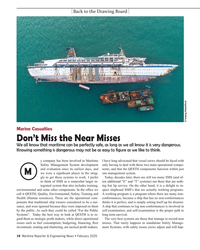 )
February 2020 - Maritime Reporter and Engineering News page: 18
)
February 2020 - Maritime Reporter and Engineering News page: 18a signi? cant player in the strug- one management system. M gle to get those systems to work. I prefer Today, decades later, there are still too many SMS (and of- to think of SMS as a somewhat larger in- ten additional “E” and “T” systems) out there that are noth- tegrated system that also includes training
-
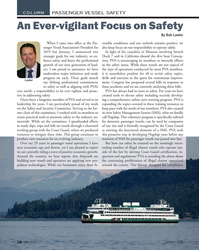 )
January 2020 - Marine News page: 18
)
January 2020 - Marine News page: 18for- keep pace with the needs of our members. PVA also created mer chair of this committee, I worked with its members to its own Safety Management System (SMS), what we fondly create practical tools to promote safety to the industry na- call Flagship. This voluntary program is speci? cally tailored tionwide
-
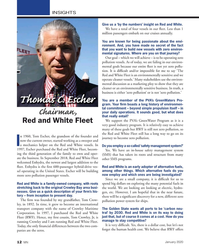 )
January 2020 - Marine News page: 12
)
January 2020 - Marine News page: 12Escher purchased the Red and White Fleet, becom- Yes. We have an in-house safety management system ing the third generation of the family to own and oper- (SMS) that has taken its roots and structure from many ate the business. In September 2018, Red and White Fleet other SMS programs. welcomed Enhydra, the
